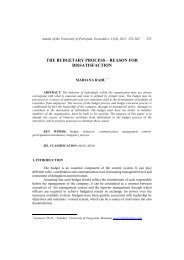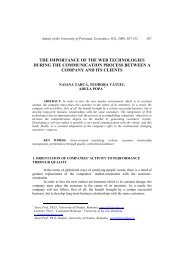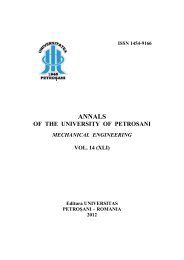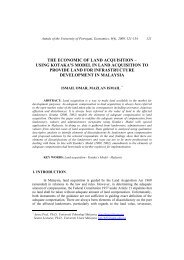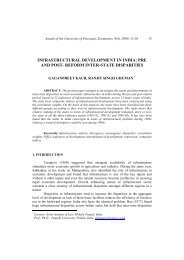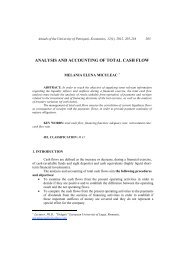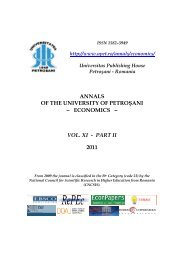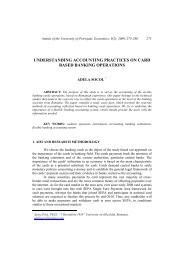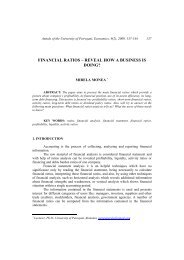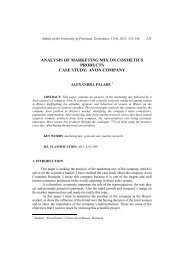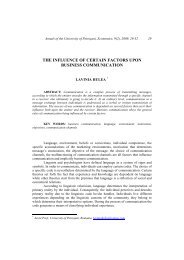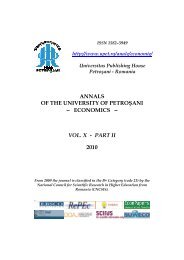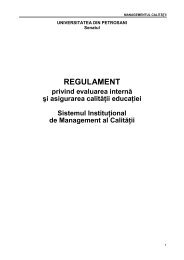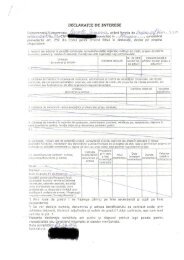annals of the university of petroÅani â¼ economics â¼ vol. xi - part i ...
annals of the university of petroÅani â¼ economics â¼ vol. xi - part i ...
annals of the university of petroÅani â¼ economics â¼ vol. xi - part i ...
You also want an ePaper? Increase the reach of your titles
YUMPU automatically turns print PDFs into web optimized ePapers that Google loves.
160 Muntean, C.; Hauer, I.; Butuza, A.<br />
In negotiation, as well as in most o<strong>the</strong>r circumstances, people must make a<br />
decision from among a lot <strong>of</strong> possible decisions, in order to achieve a certain goal. It is<br />
perfectly normal for human reasoning to analyse and to compare <strong>the</strong> possibilities, in<br />
order to adopt that decision which permits <strong>the</strong> best fulfilment <strong>of</strong> <strong>the</strong> desired goal.<br />
Although we frequently use <strong>the</strong> term "optimal decision", in most situations this<br />
"optimality" is a very complex concept which can't be defined but by mean <strong>of</strong> a<br />
ma<strong>the</strong>matical model. Ma<strong>the</strong>matical models appeared and were used in <strong>the</strong> process <strong>of</strong><br />
decision making in business, <strong>part</strong>icularly in negotiation, quite from <strong>the</strong> necessity to<br />
sustain <strong>the</strong> logical reasoning in negotiation and to manage a great number <strong>of</strong> factors<br />
simultaneously. Fur<strong>the</strong>rmore, applying <strong>the</strong>se ma<strong>the</strong>matical models permits <strong>the</strong><br />
approach <strong>of</strong> some new qualitative problems, so that it’s not surprising at all <strong>the</strong> fact<br />
that in negotiation <strong>the</strong>re are used more and more ma<strong>the</strong>matical tools, methods and<br />
techniques.<br />
REFERENCES:<br />
[1]. Andone, I.; Mockler, R.; Tugui, A. (2001) Developing expert systems in economy, Editura<br />
Economică, București<br />
[2]. Andraşiu, M.; Baciu, A.; Pascu, A.; Puşcaş, E.; Taşnadi, A. (1986) Metode de decizii<br />
multicriteriale, Editura Tehnică, Bucureşti<br />
[3], Gheorghiţă, M. (2001) Modelarea şi simularea proceselor economice, Editura ASE,<br />
Bucureşti<br />
[4]. Ionescu, G.; Cazan, E.; Negruţ, A.L. (2000) Modelarea şi optimizarea deciziilor<br />
manageriale, Editura Dacia, Cluj – Napoca<br />
[5]. Muntean, C.; Butuza, A.; Dobrican, O. (2007) Sisteme expert. Elemente de teorie şi<br />
aplicaţii. Editura Mirton, Timisoara<br />
[6]. Muntean, C.; Hauer, I. (2010) Improving <strong>the</strong> management in organizations by using<br />
Expert Systems, Simpozion Ştiinţific Internaţional, „Managementul dez<strong>vol</strong>tării rurale<br />
durabile”, Timişoara<br />
[7]. Muntean, C.; Muntean, M. (2010) Multicriterial Methods Used in Expert Systems for<br />
Business Decision Making, Revista Informatica Economică, Vol.14, No.3/2010, pp.199-<br />
205<br />
[8]. Neamţu, M.; Opriş, D. (2008) Jocuri economice. Dinamică economică discretă. Aplicaţii,<br />
Editura Mirton, Timişoara<br />
[9]. Vasiliu, C. (2003) Tehnici de negociere şi comunicare în afaceri, Editura ASE, Bucureşti<br />
[10]. Zimmermann, H.J. (2001) Fuzzy set <strong>the</strong>ory and its applications, 4th Edition, Springer<br />
[11]. http://www.exsys.com and http://www.exsys.com/CorvidTutorials.html



